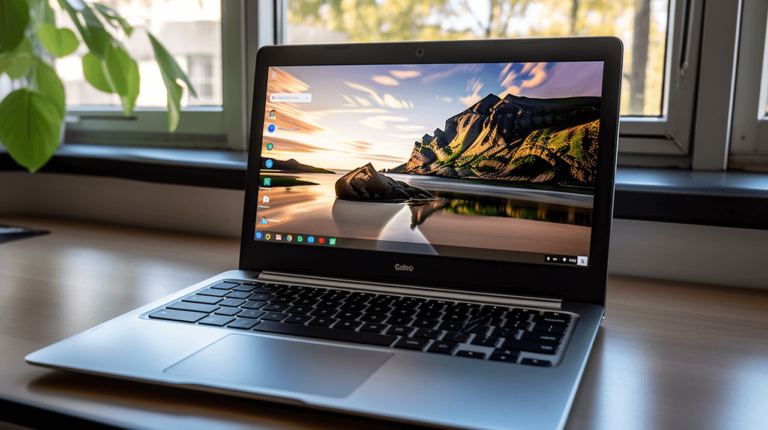A Chromebook is a laptop computer that runs Google’s lightweight operating system, Chrome OS. Chrome is based on open-source Linux.
Chrome OS is so lightweight that it doesn’t support running traditional locally installed business applications. Chromebooks do, however, support installed Android apps.
Within an enterprise, many old PCs and Macs can be converted to function like Chromebooks by installing ChromeOS Flex.
There are several factors to consider when considering using a Chromebook for business.
Pricing
Chromebooks range in price from a few hundred dollars to almost two thousand dollars.
Inexpensive Chromebooks may have an AMD processor, 4 MB of RAM, and 8 GB of solid-state storage.
High-end Chromebooks can have multi-core Intel processors, 32 GB of memory, and 246 GB of local storage.
Chrome OS security
Chrome OS updates are fast and easy to apply.
Using sandboxing, Chromebooks isolate each browser tab and application from one another. Any online threats, like infected web pages, are contained in a browser tab.
Chromebooks do a self-check on system startup called a “verified boot.” If the OS detects anything unusual, it will self-repair.
This makes Chromebooks an attractive choice if security is a high priority.
Chromebook and Business Applications
Chromebook became the leading computer in education in 2016. A Chromebook is an excellent choice for a consumer who only uses a computer to access the web.
But is Chromebook ready for business use?
For a subset of business users, it’s ready. The viability of a given user switching to a Chromebook partly depends on whether there are substitutes for all the installed applications a person uses daily.
To make a full-time switch to Chromebook, a business user would need to find cloud applications, Android apps, and or Chrome extensions that are on par with the installed apps they are accustomed to.
Here are several popular installed application types and potential cloud substitutes.
Documents, Spreadsheets, and Presentation
For companies that are using Google Workspace, users can manage and share all of their documents (Docs), spreadsheets (Sheets), presentations (Slides), and more in the cloud.
Some business users exchange complex, macro-rich spreadsheets with Microsoft Excel users at other organizations. In some cases, these spreadsheets will simply not open in Google Sheets.
Corporate attorneys often make changes to the language in contracts. Heavily redlined and commented Word documents do not always translate well into Google Docs and back.
Cloud supplement: Subscribe to Microsoft 365 Business to get the cloud versions of Excel and Word.
Online Meetings
Online meeting platforms such as Zoom, GoToMeeting, and Cisco WebEx require locally installed plugins for Windows and macOS users to host online meetings.
Google Meet (part of Google Workspace) requires nothing more than a browser — so it works the same on Chromebooks as on PCs and Macs.
Cloud alternative: Google Meet
Legacy Enterprise Applications
Often, a company’s IT department will set up remote desktop access to legacy enterprise apps that run on Windows Server. Users need access to these applications via RDP (Remote Desktop Protocol).
Chrome alternatives: Chrome Remote Desktop, Virtual Desktop & Server
Password Management
1Password is a popular password application for Windows and macOS. It syncs passwords from the desktop to the 1Password iPhone or Android app over a Wi-Fi network.
1Password can also be accessed from a Chromebook’s Chrome browser.
Cloud alternative: 1Password
Screen Recording
Camtasia is a popular screen recording application for business users. TechSmith, the publisher, offers both PC and Mac versions.
Cloud alternatives: Screencastify, Vidyard, Soapbox
Video Editing
Camtasia also has video editing capabilities for business use. Adobe Premiere Pro is a more sophisticated, general-purpose video editor.
Powerful video editing apps continue to require locally installed applications.
Cloud alternatives: VEED
Audio Editing
Many marketers have started company podcasts.
Installed applications such as Adobe Audition and Audacity allow business producers to clean up and balance the audio recordings. Intro and outro music tracks can be mixed in.
Cloud alternative: Apowersoft
Chromebook for Business Use by Job Role
For some organizations, Chromebooks could be allocated to employees based on their job roles.
For example, an inside salesperson may only need access to Google Workspace, Salesforce, Slack, and Vidyard, all cloud-based and easily accessible on a Chromebook.
Certain businesses, such as small retail operations that do not require using locally installed apps by any users, may be a candidate for providing Chromebooks to all employees.
Additional business users can switch to a Chromebook as more cloud and Android apps meet or exceed feature parity with their traditional, installed counterparts.
In the meantime, Chromebooks can still be assigned to various users within an organization based on requirements. Certain business users can look to Chromebook as a light-use, secondary laptop option for travel.
Google provides a guide for users who plan to make the switch from a PC or Mac to a Chromebook


